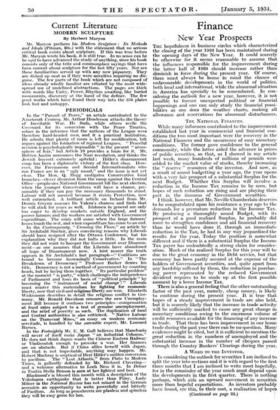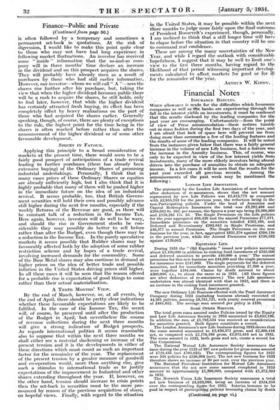Finance
New Year Prospects
THE hopefulness in business circles which characterized the closing of the year 1938 has been maintained during the opening days of the New Year. It could scarcely be otherwise for it seems reasonable to assume that the influences responsible for the improvement during the latter half of. 1933 should increase rather than diminish in force during the present year. Of course, there must always be borne in mind the chance of unfavourable developments in the world of polities, both local and international, while the abnormal situation in America has specially to be remembered. In con- sidering the outlook for a new year, however, it is not possible to foresee unexpected political or financial happenings and one can only study the financial possi- bilities as one does the weather charts, making all allowance and reservations for abnormal disturbances.
THE NATIONAL FINANCES.
While many influences contributed to the improvement established last year in commercial and financial con- ditions the two most important were the recovery in the National Finances and the occurrence of easy monetary conditions. The former gave confidence to the general community, while the latter aided the advance in prices of public securities, so that, as I showed in my article last week, many hundreds of millions of pounds were added to the market value of stocks, thereby increasing the " reserve " resources of the investor. And now, as a result of sound budgetting a year ago, the year opens with a very fair prospect of a substantial Surplus for the next Budget. Whether this Surplus will involve: a reduction in the Income Tax remains to be seen, but hopes of such reduction are rising and are playing their part in the firmness of Government securities. I think, however, that Mr. Neville Chamberlain deserves to be congratulated upon his resistance a year ago to the demands for a premature reduction in the Income Tax. By producing a thoroughly sound Budget, with its prospect of a good realized Surplus, he probably did more to strengthen confidence and aid financial recovery than he would have done if, through an immediate reduction in the Tax, he had in any way jeopardized the results for the year. Today the position is somewhat different and if there is a substantial Surplus the Income Tax payer has undoubtedly a strong claim for consider- ation. Much of the realized Surplus for this year will be due to the great economy in the Debt service, but that economy has been partly secured at the expense of the holders of Government securities, and, quite apart from any hardship suffered by them, the reduction in purchas • ing power represented by the reduced Government dividend requires to be made up at the first possible moment by a lower Income Tax.
There is also a general feeling that the other outstanding factor of the past year, namely, cheap money, is likely to continue during the present year. It is true that hopes of a steady improvement in trade are also held, but it is scarcely likely that the increase in trade activity will be sufficiently marked to cause any great change in monetary conditions owing- to the enormous volume of credit resources available for the financing of any increase in trade. That there has been improvement in our home trade during the past year there can be no.question. Many evidences might be cited, but it is sufficient to mention the great reduction in the numbers of unemployed and the substantial increase in the number of cheques passed through the Country Bankers' Clearings during the year. A WORD TO THE INVESTOR.
In considering the outlook for securities I am inclined to split the year into sections and it is with regard to the first three months that I am inclined to write most hopefully, for in the remainder of the year much must depend upon the developments in the first quarter. There is nothing perhaps, which aids an upward movement in securitie's more than hopeful expectations. As investors probably have found, ere this, to their cost, a realization of hopes (Continued on page 32.)
Finance—Public and Private
(Continued from page 80.) is often followed by a temporary and sometimes a permanent set-back in quotations. At the risk of digression, I would like to make this point quite clear to those who may not have had long experience in following market fluctuations. An investor ha S received some " inside " information that the so-and-so com- pany will in three months' time declare an increase in the dividend and on this prospect acquires the shares.- They will probably have already risen as a result of purchases by those who had still earlier information. However, our investor—whom we will call" A "—Sees the shares rise further after his purchase, but, taking the view that when the higher dividend becomes public there will be a rush to acquire the shares, he still holds, only to find later, however, that while the higher- dividend has certainly attracted fresh buying, its effect has been completely offset by heavy realizations on the part of those who had acquired the shares earlier. Generally speaking, though, of course,-there are plenty of exceptions to the rule, the highest point for the time. being in the shares is often reached before rather than after the announcement of the higher dividend or of some other favourable development.
STOCKS IN FAVOUR.
Applying this principle to a broad consideration of markets at the present time, there would seem to be a fairly good prospect of anticipations of a trade revival leading to further purchases (there has already been extensive buying) of the Ordinary Shares of promising industrial undertakings. Personally, I think that in many cases prices of these Ordinary Shares or equities are already sufficiently high, but I also think that it is highly probable that many of them will be pushed higher in the immediate future on the idea of an industrial revival. It seems probable, too, that British Govern- ment securities will hold their own and possibly advance still higher during the next few months, especially if the weekly Returns of the Revenue are good, as there will be constant talk of a reduction in the Income Tax. Here again, however, investors will do well to be wary, and should the rise in Government stocks be con- siderable they may possibly do better to sell before rather than after the Budget, even though there may be a reduction in the Income Tax. In the purely speculative markets it seems possible that Rubber shares may be favourably affected both by the adoption of some rubber restriction scheme and by hopes of a trade revival, involving increased demands for the commodity. Some of the Base Metal shares may also continue in demand at higher prices on the idea of better trade and possible inflation in the United States driving prices still higher. In all these cases it will be seen that the reason offered for a probable rise is expectation of good things to come rather than their actual materialization.
A THREE MONTHS' VIEW.
By the end of March, however, or, at all events, by the end of April, there should be pretty clear indications whether these favourable expectations are likely to be fulfilled. In the case of the Income Tax, the secret will, of course, be preserved until after the production of the Budget in April; but nevertheless the course of revenue collections during the next three months will give a strong indication of Budget prospects. As regards international politics it seems reasonable also to suppose that within the next three months we shall either see a material slackening or increase of the present tension and it is the developments in either of these directions which must count as such an important factor for the remainder of the year. The replacement of the present tension by a greater measure of goodwill and co-operation would, more than anything else, give such a stimulus to international, trade -as to justify expectations of the improvement in Industrial and other shares extending throughout the year. If, however, on the other hand, tension should increase to crisis-points then the set-back in securities must be the more pro- nounced by reason of the previous acquisition of share, on hopeful views. Finally, with regard to the situation. in the United States, it may be possible within the next three months to judge more fairly upon the final outcome of President Roosevelt's experiment, though, personally, I am inclined to think that a still longer time will have to elapse before the situation in that country will be one to command real confidence.
These are among the many uncertainties of the New _Year, and while I regard the outlook with considerable hopefulness, I suggest that it may be well to 'limit one's view to the first three months, hiving regard to the likelihood of that period witnessing important ,develo0- ments calculated to affect markets for good or fOr 111 for the remainder of the-year. ARTHUR W. KIDDY. ;







































 Previous page
Previous page